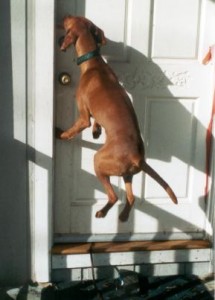 At my piano lesson early this week, my teacher’s dog saw her dog friend and the dog’s owner pass by the window. She often walks with them, but not that day. It was hard for her to understand why they were going without her, and she pranced around unhappily, left behind. It made me think of this poem, from What the Living Do, by Marie Howe. The book deals (for the most part) with poems about her brother’s death. What I love about this one is it’s oblique approach to mourning.
At my piano lesson early this week, my teacher’s dog saw her dog friend and the dog’s owner pass by the window. She often walks with them, but not that day. It was hard for her to understand why they were going without her, and she pranced around unhappily, left behind. It made me think of this poem, from What the Living Do, by Marie Howe. The book deals (for the most part) with poems about her brother’s death. What I love about this one is it’s oblique approach to mourning.
Buddy
Andy sees us to the door, and Buddy is suddenly all over him, leaping
and barking because Andy said: walk. Are you going to walk home? he said.
To me. And Buddy thinks him and now, and he’s wrong. He doesn’t
understand the difference between sign and symbol like we do–the thing
and the word for the thing, how we can talk about something when it’s not
even there, without it actually happening–the way I talk about John.
Andy meant: soon. He meant me. As for Buddy, Andy meant: later. When he
was good and ready, he said. Buddy doesn’t understand. He’s in a state
of agitation and grief, scratching at the door. If one of us said, Andy,
when Andy wasn’t there, that silly Buddy would probably jump up barking
and begin looking for him.
Marie Howe
I memorized this poem years ago, but one line has always bothered me: “He doesn’t /
understand the difference between sign and symbol like we do” because it seems to me that sign and symbol are analogous, not opposites. I happened to take a workshop with Marie Howe and asked her about it, but her explanation didn’t make any sense to me. It still seems to me that the difference is between action and the symbol, “the thing / and the word for the thing.” What do you think?
when I read “like we do” I paused and thought: “but I don’t.” I reread it and still couldn’t make out exactly what she meant. So the dog hears “walk” and naturally thinks it applies to him, but it seems a more simple and work a day confusion. One thing it does do, that line, is put me in a space hovering above the day to day world. Maybe that’s the ticket. I am not sure.
So many times I latch on to a line of poetry that means something dart like to me, but I am many times unsure if that is what the poet meant when they wrote that line.
And I think many times the poet doesn’t either! And I include myself here.
Hi. I’m glad you posted this poem, it was the first time I’ve read it, but not the first time I’ve read Marie Howe. She is a beautiful poet to me.
What she’s said is talking about the uncanny difference between sign and signifier…even though, as you said, those ideas are analogues, she was speaking about how the difference between two things can be so stark, so vast, almost like opposites.
When we talk “about” something it can often have the weird effect of removing ourselves from that thing. Marie talks about a dog, who has no concept of the difference between saying a word, and actualizing it. We, humans, do. But then sometimes, a thing has such an emotionally strong resonance so us, that even a mention of that word sets off our neurons firing in such a way that it seems we expect that thing to happen, right here, right now.
In the poem, that word was “walk”. The dog cannot hear mention of that word without thinking of the real thing, and getting ready for it. In Marie’s mind, the word that provokes the same instinctual response is “Andy”. She cannot divorce herself from that mentality.
She recognizes that there is a huge chasm between the words people say, and what is actually happening, so much so that they sometimes become opposites…but she also recognizes how trapped we are, hearing certain words, and our brains immediately following to that sometimes illogical conclusion.
Thanks for that, Drew. It makes sense to me. Though I think the word in Marie’s mind is “John,” her brother who died. Andy is the dog’s owner, and the dog reacts to his name as he does to the word “walk.”